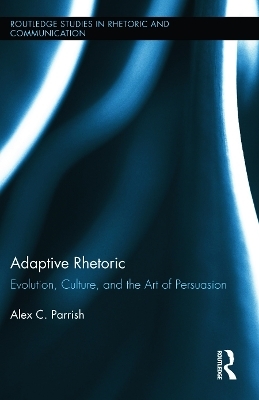
Adaptive Rhetoric
Evolution, Culture, and the Art of Persuasion
Seiten
2013
Routledge (Verlag)
978-0-415-72751-8 (ISBN)
Routledge (Verlag)
978-0-415-72751-8 (ISBN)
Rhetorical scholarship has for decades relied solely on culture to explain persuasive behavior. While this focus allows for deep explorations of historical circumstance, it neglects the powerful effects of biology on rhetorical behavior – how our bodies and brains help shape and constrain rhetorical acts. Not only is the cultural model incomplete, but it tacitly endorses the fallacy of human exceptionalism. By introducing evolutionary biology into the study of rhetoric, this book serves as a model of a biocultural paradigm. Being mindful of biological and cultural influences allows for a deeper view of rhetoric, one that is aware of the ubiquity of persuasive behavior in nature. Human and nonhuman animals, and even some plants, persuade to survive - to live, love, and cooperate. That this broad spectrum of rhetorical behavior exists in the animal world demonstrates how much we can learn from evolutionary biology. By incorporating scholarship on animal signaling into the study of rhetoric, the author explores how communication has evolved, and how numerous different species of animals employ similar persuasive tactics in order to overcome similar problems. This cross-species study of rhetoric allows us to trace the origins of our own persuasive behaviors, providing us with a deeper history of rhetoric that transcends the written and the televised, and reveals the artifacts of our communicative past.
Alex C. Parrish is Assistant Professor of Writing, Rhetoric, and Technical Communication at James Madison University, USA.
Introduction Part I 1. Classical Naturalism 2. Nature, Nurture, and Negativity: Wilson’s Consilience and the Art of Rhetoric 3. Is it Adaptive? Is it Rhetoric? Part II 4. Animal Signaling and the Art of Persuasion 5. Deception, Mimicry, and Camoflage 6. Rhetoric and Theory of Mind 7. Evolutionary Memoria: Grounded Cognition and the Fourth Canon Conclusion: The Significance of an Interdisciplinary Approach
| Reihe/Serie | Routledge Studies in Rhetoric and Communication |
|---|---|
| Verlagsort | London |
| Sprache | englisch |
| Maße | 152 x 229 mm |
| Gewicht | 520 g |
| Themenwelt | Sachbuch/Ratgeber ► Natur / Technik ► Natur / Ökologie |
| Geisteswissenschaften ► Philosophie ► Sprachphilosophie | |
| Geisteswissenschaften ► Psychologie ► Allgemeine Psychologie | |
| Geisteswissenschaften ► Sprach- / Literaturwissenschaft ► Sprachwissenschaft | |
| Naturwissenschaften ► Biologie ► Evolution | |
| Sozialwissenschaften ► Kommunikation / Medien ► Kommunikationswissenschaft | |
| Weitere Fachgebiete ► Land- / Forstwirtschaft / Fischerei | |
| ISBN-10 | 0-415-72751-0 / 0415727510 |
| ISBN-13 | 978-0-415-72751-8 / 9780415727518 |
| Zustand | Neuware |
| Haben Sie eine Frage zum Produkt? |
Mehr entdecken
aus dem Bereich
aus dem Bereich
über 500 faszinierende Gesteine, Minerale, Edelsteine und Fossilien
Buch | Hardcover (2023)
DK Verlag Dorling Kindersley
26,95 €
Familien und Gattungen einheimischer Pflanzen
Buch | Hardcover (2022)
Haupt Verlag
64,00 €
Klimaschutz zerstört die Wirtschaft! ... und andere Stammtischparolen …
Buch | Softcover (2024)
Komplett-Media (Verlag)
24,00 €


